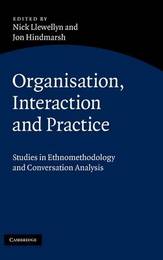
|
Organisation, Interaction and Practice: Studies of Ethnomethodology and Conversation Analysis
Hardback
Main Details
| Title |
Organisation, Interaction and Practice: Studies of Ethnomethodology and Conversation Analysis
|
| Authors and Contributors |
Edited by Nick Llewellyn
|
|
Edited by Jon Hindmarsh
|
| Physical Properties |
| Format:Hardback | | Pages:284 | | Dimensions(mm): Height 235,Width 159 |
|
| Category/Genre | Organizational theory and behaviour |
|---|
| ISBN/Barcode |
9780521881364
|
| Classifications | Dewey:302.35072 |
|---|
| Audience | | Professional & Vocational | |
|---|
|
Publishing Details |
| Publisher |
Cambridge University Press
|
| Imprint |
Cambridge University Press
|
| Publication Date |
11 February 2010 |
| Publication Country |
United Kingdom
|
Description
Ethnomethodology has an elusive relationship with organisation studies. The ethnomethodological work of Harold Garfinkel, and the allied conversation analytic work of Harvey Sacks, is often cited and yet empirical contributions informed by ethnomethodology and conversation analysis remain rare. Organisation studies clearly has a lot to say about work but this is normally related to some broader set of social, economic and political issues. Rarely, if ever, does this research involve an analysis of the mundane and practical details of what actual work consists of. This book acts as an evidence-based corrective by showing how research based on ethnomethodology and conversation analysis can contribute to key issues and debates in organisation studies. Drawing on audio/video recordings from a diverse range of work settings, a team of leading scholars present a series of empirical studies that illustrate the importance of paying attention to the real-time achievement of organisational processes and practices.
Author Biography
Nick Llewellyn is Associate Professor (Reader) in the Organisation Studies, Industrial Relations and Organisational Behaviour Group at Warwick Business School, University of Warwick. Jon Hindmarsh is Reader in Work Practice and Technology in the Department of Management, King's College London.
ReviewsReview of the hardback: 'This volume demonstrates the thousands of 'small ways' and 'artful practices' through which people recognise and reproduce the organisational location of their actions. It offers a rich panorama of ethnomethodologically informed studies of ordinary work and in so doing it brings something distinctive to the table of organisation studies.' Silvia Gherardi, University of Trento Review of the hardback: 'This book is essential reading for researchers and students of organisations, management and business. It reveals the amazing insights generated by researchers applying ethnomethodology, CA, DA and workplace studies to audio and video data from real-time organisational settings. Nick Llewellyn and Jon Hindmarsh deserve congratulations for assembling the very best set of authors to deal with this field. This trailblazing, lucid book will set the standard for years to come.' David Silverman, Goldsmiths College, University of London Review of the hardback: 'I cannot overstress how much a gap this book fills, nor how well crafted its papers are. Nick Llewellyn and Jon Hindmarsh are to be congratulated for putting together such a delightful, focused and sophisticated collection of papers. We badly need work on the micro-foundations of organisational behaviour, and this splendid book, with its strong ethnomethodological focus, shows how we could study organisations as interactive accomplishments. Supporters of process- and practice-based perspectives, take notice!' Haridimos Tsoukas, Athens Laboratory of Business Administration (ALBA) and Warwick Business School Review of the hardback: 'With Organisation, Interaction and Practice, Nick Llewellyn and Jon Hindmarsh edited the book I wish I had when I was beginning my graduate studies. They offer organization students and academics a comprehensive collection of theoretical and empirical chapters discussing and exemplifying the use of ethnomethodological and conversation-analytical (EM/CA) approaches to the study of organizations. This book, written by prominent authors in the field (including, for example, Christian Heath and Paul Luff or Colin Clark and Trevor Pinch), will surely become a household name thanks to its systematic exposition of EM/CA principles and its overall quality ... [it] will certainly end up being a 'classic' of EM/CA teaching, as it offers both an introduction to the theories and excellent case studies. ... the empirical section should serve as a model of high quality research even for more established scholars, who may have acquired some bad habits over time.' Scandinavian Journal of Management
|